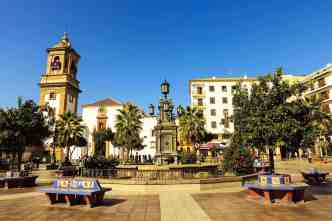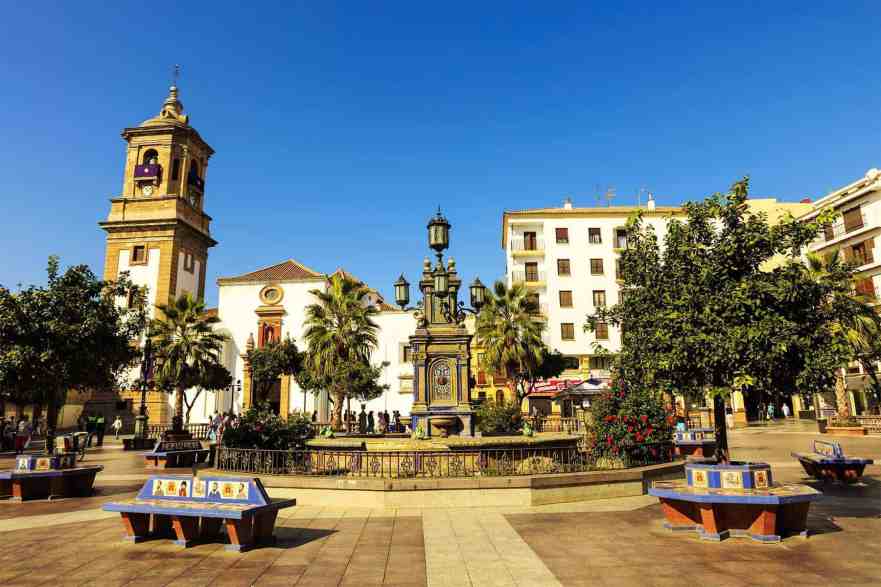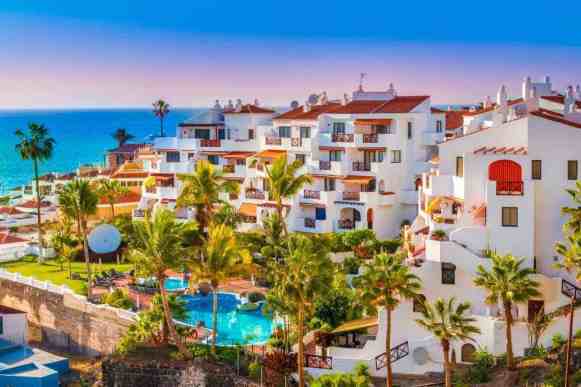US, UK, and Canadian citizens, among others, can enter Spain without a visa for trips less than 90 days. However, you can only travel for 90 days in any 180-day period, meaning you can spend a maximum of six months in every 12 in the country, with three-month intervals.
If you plan to stay for longer or live in Spain permanently, you will have to obtain a long-stay visa that will allow you to apply for residency in Spain.
Spain visa options for non-EU citizens
There are different kinds of long-stay visas; here’s the list of the most popular options for people moving to Spain independently:
Non-lucrative visa
The non-lucrative visa is also known as the retirement visa.
To be eligible for this visa, you must have evidence of either €30,000 in a bank account or a monthly income of €2,130 from your pension. This increases to around €2,600 for a couple, although the amounts may change.
Also, a retirement visa is only given on the condition that you won’t undertake any paid work for the duration of your stay in Spain. This includes remote work, but after the first 12 months, you can convert it into an employment visa.
The initial application is completed at the Spanish embassy in your country of residence, but subsequent renewals must be completed at your local town hall in Spain. They will put you on the padrón municipal list, although this isn’t the same as being registered as a Spanish resident.
Required documents
- The completed visa form.
- A passport or travel document recognized by Spain: Your passport must be valid for at least 12 months and contain at least two blank pages. Also, provide a copy of all the pages in your passport.
- A passport photo.
- Proof of sufficient funds.
- Private health insurance policy: Obtain coverage from an insurance company licensed to operate in Spain.
- A medical certificate: Issued within three months of your visa application, stating that you do not suffer from diseases that can represent a serious risk to public health.
- A certificate of criminal record: This must be issued by the country where you have lived in the previous five years. The certificate must be issued within the last three months.
- If not a national of your current country of residence: Show proof of a valid residence permit and provide a copy of it.
- For dependents who are your spouse or partner: Submit your marriage or civil partnership certificate.
- For dependent descendants: You need to provide their birth certificate.
Ensure that your marriage certificate and birth certificates are translated (sworn translation) and legalized through the consular representatives of the issuing country or carry the Hague Apostille unless they were issued by an EU member state.
After obtaining the non-lucrative visa stamp in your passport for Spain, you have a one-month window to enter the country and initiate the application for your Foreign Resident Card (Tarjeta de Identidad de Extranjero).
This usually happens at a national police station in the area you’ve designated as your place of residence.
Your first permit lasts for 12 months, and the next two renewals are two years each, totaling five years. Once you reach this point, you can apply for full residency status.
For UK citizens moving to Spain, our Living In Spain After Brexit guide helps navigate the post-Brexit changes in immigration, taxation, healthcare, and other issues.
Spanish entrepreneur visa
The first type of investment visa is the Entrepreneur Visa. This is for people looking to set up a business in Spain. It’s either issued as a new visa or as an extension of a different kind of visa.
To be eligible, you must have a business plan that’s approved by the Spanish government and evidence of appropriate funding.
Unlike other EU countries, Spain doesn’t have an official guideline as to how much funding you need. Presumably, it needs to be appropriate and proportional to your business model.
You must also supply evidence that you can support yourself financially while in Spain, must have evidence of healthcare, and have all documents translated into Spanish.
You can apply through the Spanish consulate in your home country.
The investor visa (Golden Visa)
One area where Spain matches other EU countries is in the requirements for their golden visa program. The most common method of obtaining this visa is through purchasing property worth at least €500,000, but other options include:
- Making an investment in Spanish public debt worth at least €2,000,000.
- Make a deposit in a Spanish bank or buy shares worth at least €1,000,000.
- Invest a significant amount of money in a new business (no specific amount).
You must be committed to investing when applying for the visa. A golden visa covers you for 12 months, after which it can be exchanged for a residence permit.
Bear in mind that the golden visa covers family members, including spouses and children under the age of 18.
You can use the golden visa to obtain permanent residency after five years of living in the country (for at least six months of the year). Alternatively, you can renew the permit indefinitely if you don’t plan to live in Spain.
If you have questions or need more information, see our EU Golden Visa guide for full options, or contact us via our page on Residency and Citizenship. We will be happy to help.
Spain Digital Nomad Visa
The digital nomad visa offers a flexible residence permit extendable up to 5 years, enabling non-EU citizens to work remotely while living in Spain.
Unlike the non-lucrative visa, this option explicitly permits remote work.
You can either apply directly from Spain with a tourist visa for a 3-year card or apply in your home country via a Spanish Consulate for a 1-year visa convertible to a 3-year card upon entry to Spain.
The digital nomad visa caters to two main groups:
- Employees whose company permits remote work and travel, allowing them to work from Spain.
- Self-employed individuals with clients or online income sources located outside of Spain.
To qualify for the digital nomad visa, here are the key criteria:
- Work must be for companies located outside Spain, with no more than 20% of income from Spanish sources.
- Minimum three months of working relationship or freelance work with clients before applying, with a 1-year contract.
- Maintain a yearly salary of €30,240 (€2,520 monthly).
- Demonstrate either three years of prior work experience or hold a degree from a reputable institution.
- Clear criminal record, validated by a criminal records certificate dated within 90 days and legalized.
- Fill out the application form and pay the administrative fee of €790.38.
- Obtain private health insurance covering Spain.
- Depending on employment type (employee or freelancer), provide proof of the company’s operation for at least one year (for employees) or specify remote work terms and conditions (for freelancers).
Tax benefits for remote employees
For remote employees of foreign companies in Spain, taxation operates under the Non-Resident Income Tax Regime. If you haven’t resided in Spain for the past 5 years, you’re eligible for a flat tax rate of just 24% on your income instead of facing a progressive rate that could reach up to 48%.
The application for this tax status is a separate process from residency and should be completed with the Spanish Tax Agency within six months of obtaining your residency authorization.
EU Blue Card for highly skilled professionals
EU Blue Cards offer highly qualified non-EU nationals an opportunity to reside and work within EU nations, including Spain.
Key eligibility criteria for the EU Blue Card include demonstrating a higher professional qualification spanning a minimum of three years or possessing at least five years of professional experience at a similar level.
Additional conditions include:
- A job offer from a Spanish employer for a paid position (self-employed individuals are ineligible)
- The offered job should pay a salary of at least one and a half times the average wage in Spain (or 1.2 times for high-demand roles)
- The job contract must be for a minimum of one year
- Health insurance coverage for oneself and accompanying family members
- Compliance with legal requirements for professional practice, if applicable
Applications for the EU Blue Card are facilitated by the Spanish employer, involving submission of relevant documents regarding the job, qualifications, passport, and health insurance details. The EU Blue Card is initially valid for one year, extendable upon meeting the specified conditions.
Residency in Spain (Residencia)
To live in Spain permanently, you need to register as a foreign resident. For this, you need to be added to the Central Register for Foreign Nationals or Registro Central de Extranjeros.
Where to apply for your Spanish residency certificate
You need to book an appointment online at your nearest National Police station to submit your application and all the documents (the requirements vary according to your visa).
You can also apply at the Oficina de Extranjería – the immigration administration office of the Spanish government. Every main city in each province in Spain has a branch of the Oficina de Extranjería .
Once you are on the Register, you will be issued with a Resident Certificate – Certificado de Residente – which will include the date of registration, your name, address, nationality and NIE number.
Permanent residency in Spain
If you have lived in Spain for five years and already have Certificado de Residente, you can apply for permanent residency if you wish to.
You will need to use the same forms and pay the same tax. No additional paperwork should be required. However, the authorities might ask for proof you have been living in Spain for five years.
For this, keep your bank receipts, rental contracts, utility bills, and any other official letters with your name and address from the very beginning of your settlement in Spain.
What’s an NIE and why you need one
An NIE or foreigners’ identification number is the expat equivalent of the local Spaniards’ DIE or Documento Nacional de Identidad. It is a bit like the British National Insurance number and is necessary when you deal with various local or state services.
An NIE number is mandatory for all foreigners with financial, professional or social affairs in Spain, regardless of whether they are a resident or non-resident in Spain.
You are asked for it if you buy a property in Spain, buy or insure a car in Spain, if you want to open a Spanish bank account, or set up utility bills or sign up for the Spanish state healthcare system. You will also need it if you conduct any financial and/or professional in Spain, regardless of whether you are a resident or non-resident in Spain.
Children also need an NIE number in order to, among other things, get social security.
In short, any paperwork you must do in Spain as a foreigner will require the NIE number.
You will be automatically issued an NIE when you apply for your Residency Certificate.
Applying for an NIE only
If you don’t need a residency in Spain (if, for example, you aren’t going to spend more than 3 months in a year in Spain), you can apply for an NIE only.
The application procedure may vary depending on where in Spain you apply. Generally, to obtain an NIE number, you need to:
- Fill out the NIE application form (EX-15). You can download the form online and print it out, or you can get it at any NIE office. You must fill in the form in Spanish. If you need help with it, there is advice available online, just google “filling in EX-15 form Spain”.
- If you’re already in Spain, go to your nearest police station or Oficina de Extranjeros. Outside of Spain, find a Spanish Consulate (the “Consulate dept legalizaciones”, not the Embassy) to submit the documents.
Together with two originals of EX-15 form you need to file in the following:
- Your passport and a copy of your passport (all pages)
- A small fee, payable at the bank using a 790 NIE form. This can now only be filled in online and printed out. Find the form online and take it to any bank to pay before going to the police station
You need to book an appointment at the National Police Station. It can be done online.
You will be given a white certificate with the number on it. In some cases, you may be asked to collect it another day. NIE numbers always begin with the letter X, Y or Z.
Registering on a Padron
All Town Halls in Spain keep a register of the residents of their area – the Padron. It’s used by the government and local authorities to make sure they know how many people live in the area.
If you live in Spain for more than six months in a year, you should register on the Padron.
You will find you need it when registering with a family doctor, or applying for facilities offered via Social Security or sending your children to a local school.
You need to apply at your local Town Hall. Make sure you know the requirements – they differ from area to area.
Normally, you would need the following:
- Your original passport and a photocopy
- Your title deeds and a photocopy if you own a property
- Your rental contract in Spanish and a photocopy if you’re renting
The certificate confirming your registration on the Padron only lasts for 90 days. You will only need the certificate when you are asked to prove that you are registered.
It doesn’t happen so often, but when you need it, you just visit your local council to get a fresh one.
If the prospect of doing all this paperwork on your own terrifies you, you can always recruit a local helper – gestor. Find out more in our guide to Using Gestorias In Spain To Help With Your Paperwork.
You might find useful:
- Living In Spain – all you need to know to move to and settle down in Spain: paperwork, healthcare, housing, the cost of living, banking, taxes, etc.
- Best Places To Live In Spain – the best and most popular expat locations in Spain.
- Haven’t found what you were looking for? Contact us or comment below with your question and we’ll do our best to help.















at the moment i am selling my property in the uk not sure how long this will be.can i stat a bank account before i get to benidorm. and to buy a place outright do i need the nie number, trying to get my head around everthing. just need to no how long wouid it take roughly to but and move in right away
Hi Roy,
You do need NIE for purchasing your property, you can get it from a Spanish consulate: https://www.exteriores.gob.es/Consulados/londres/en/ServiciosConsulares/Paginas/Consular/NIE.aspx
To open a bank account in a regular Spanish bank, you need to be there personally, your solicitor or your estate agent in Benidorm can advise you on the best banking option. Hope this helps,